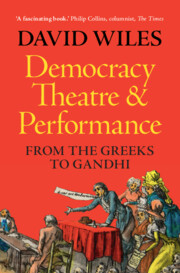Book contents
- Democracy, Theatre and Performance
- Democracy, Theatre and Performance
- Copyright page
- Contents
- Figures
- Acknowledgements
- Introduction
- Chapter 1 Rhetoric in Athens
- Chapter 2 Acting versus Sincerity
- Chapter 3 Puritan Democracy
- Chapter 4 Oratory in the French Revolution
- Chapter 5 American Democracy
- Chapter 6 Democracy as a Universal Good
- Chapter 7 Theatre and Theatrocracy in Democratic Athens
- Notes
- References
- Index
Chapter 5 - American Democracy
From the Founders to Feminism
Published online by Cambridge University Press: 17 May 2024
- Democracy, Theatre and Performance
- Democracy, Theatre and Performance
- Copyright page
- Contents
- Figures
- Acknowledgements
- Introduction
- Chapter 1 Rhetoric in Athens
- Chapter 2 Acting versus Sincerity
- Chapter 3 Puritan Democracy
- Chapter 4 Oratory in the French Revolution
- Chapter 5 American Democracy
- Chapter 6 Democracy as a Universal Good
- Chapter 7 Theatre and Theatrocracy in Democratic Athens
- Notes
- References
- Index
Summary
De Tocqueville helps us see American democracy as a way of life shaped by individualism and a dislike of theatrical display. In John Adams, the ideals of Protestant Christianity and Roman republicanism collided. Adams believed in personal integrity, but was unashamed to perform a social role, inspired by the Roman republican orator Cicero. In the nineteenth century Hugh Blair repositioned rhetoric as a way to speak truth, in a language that in practice confined truth-speaking to the elite. When working-class Irish Americans sought a more inclusive democracy, they found a symbolic representative in the actor Edwin Forrest, and many died in the ensuing riot outside a new opera house in 1849. Black Americans first found a public voice through the person of Frederick Douglass, whose oratory was founded both on preaching and on the old flamboyant republican tradition. Women first demanded a voice in the context of Quakerism and the campaign to abolish slavery. Elizabeth Cady Stanton later argued for female suffrage in terms that were more secular, more individualist and ultimately more elitist.
Keywords
- Type
- Chapter
- Information
- Democracy, Theatre and PerformanceFrom the Greeks to Gandhi, pp. 117 - 144Publisher: Cambridge University PressPrint publication year: 2024



